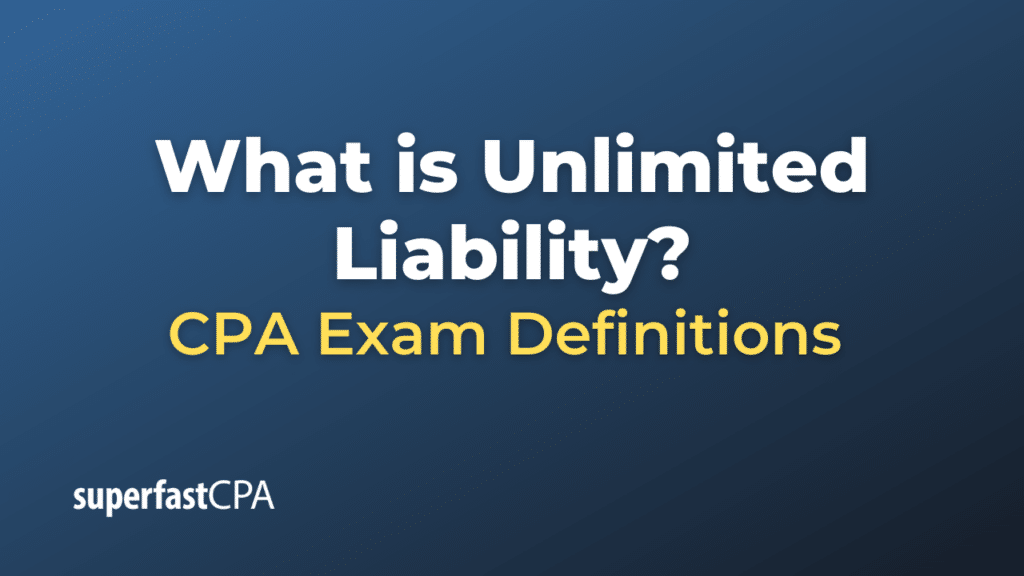Unlimited Liability
Unlimited liability refers to the legal obligation of an owner or owners of a business to personally pay off all of the business debts and obligations, without any limit. In business structures with unlimited liability, the personal assets of the owner or owners are not separate from the business assets, meaning that creditors can pursue the personal assets of the owner(s) to satisfy business debts.
Business Structures with Unlimited Liability
- Sole Proprietorship: In a sole proprietorship, the individual owner has unlimited liability for all debts incurred by the business. This means that if the business defaults on its debts, the owner is personally responsible for paying them off, potentially putting personal assets like home, savings, and other valuables at risk.
- General Partnership : In a general partnership, all partners have unlimited liability for the debts and obligations of the business. Any partner can be held responsible for the entire amount of business debts, even if one of the partners incurs the debt without the knowledge of the others.
Pros and Cons
Pros
- Ease of Setup: Businesses with unlimited liability are often easier and less expensive to set up and operate.
- Control : The owner or partners maintain complete control over the business and its assets.
- Profit Retention: All profits go directly to the owner or are shared among partners, without the need for a formalized distribution system.
Cons
- Personal Risk: The primary disadvantage is the risk to personal assets. Owners are personally responsible for all business debts and liabilities.
- Capital Raising: It can be more challenging to raise capital since the structure does not allow for the sale of stock.
- Business Continuity: These types of businesses often dissolve if an owner withdraws or passes away, unless there are arrangements in place to prevent this.
Example of Unlimited Liability
Let’s consider a real-world example to illustrate the concept of unlimited liability.
Example: The Case of Bob’s Auto Repair
Bob owns a small auto repair shop as a sole proprietor. He offers various services like oil changes, brake repairs, and engine diagnostics. Over the years, Bob built up a loyal customer base and has a decent income from the business.
The Situation
Due to unexpected market conditions, including a pandemic and a decrease in travel, the demand for auto repair services drops significantly. At the same time, the rent for his shop increases, and he experiences a few instances of vandalism, adding extra costs for repairs and security upgrades.
To keep the business running, Bob takes out a loan but eventually realizes he cannot meet his financial obligations. Despite selling off his business assets, he’s still short of $50,000 to settle the remaining debt.
The Unlimited Liability Impact
Since Bob operates as a sole proprietor, he has unlimited liability for the debts of the business. This means creditors can go after his personal assets to recover the remaining $50,000.
Bob owns a house valued at $200,000 and has personal savings of $30,000. In the worst-case scenario, he might have to sell his house or use his personal savings to pay off the business debts.
Accounting Entries (Simplified)
- Initial Loan Taken: Debit Bank $100,000, Credit Loan Payable $100,000
- Expenses Incurred: Debit Various Expenses $100,000, Credit Bank $100,000
- Partial Repayment from Business Assets: Debit Loan Payable $50,000, Credit Bank $50,000
- Personal Asset Used to Clear Debt: Debit Loan Payable $50,000, Credit Personal Contribution (Owner’s Equity) $50,000
Lessons Learned
- Personal Risk : Unlimited liability puts personal assets at risk, a factor that should be carefully considered when choosing a business structure.
- Financial Planning: The importance of robust financial planning and risk assessment cannot be overstated, particularly for businesses with unlimited liability.
Bob’s situation exemplifies the risks involved in business structures with unlimited liability. While it may offer simplicity and fewer regulations, the personal financial risk is high, and individuals could potentially lose their personal assets to cover business debts.













